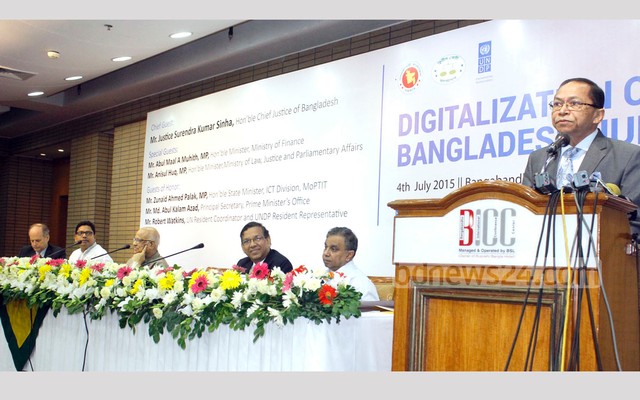Chief Justice Surendra Kumar Sinha deserves our thanks. He has reminded us once again of the ills which keep our society in a bind. To be sure, these are maladies we have consistently and regularly suffered from. But when the Chief Justice speaks of them, when he reflects on the role of political partisanship coming in the way of a proper prosecution of cases, it makes a world of difference. And it does because of the old truism that political loyalty is not necessarily a guarantee of professionalism in any region of public life. Where the appointment and performance of public prosecutors is concerned, every government in Bangladesh has been careful that its own people, those who swear fealty to it, occupy those significant positions in the legal system. The result has been appalling. The Chief Justice knows that and we know that.
And, yes, we can be quite certain that Justice Sinha, like the rest of us, remains acutely aware of the battering the national image has taken in recent years owing to this propensity on the part of governments, in both BNP and Awami League times, to place people in positions where better individuals should have occupied those spots. It was certainly not like this before.
Take the instance of the appointment of university vice chancellors. In Bangabandhu’s time, care was taken that recognized scholars reputed for their liberalism and secular points of view, but not for their allegiance to the ruling party, were chosen as vice chancellors of different universities. Khan Sarwar Murshid, Mozaffar Ahmed Chowdhury, Abdul Matin, to name a few, were academics who enhanced the office of vice chancellor through their scholarly record and administrative performance.
In the era of General Ziaur Rahman, there were such respected individuals as Professor Shamsul Haq and Abdul Halim Chowdhury who maintained a distinguished presence as vice chancellors. And then there was the other Shamsul Haq. Sadly enough, that enviable tradition has not been maintained. The run of vice chancellors we have observed since 1991, on the watch of both the BNP and the Awami League, has proved deeply disappointing. Party loyalty has been everything. Scholarship has taken a backseat to partisan genuflection. Why else would intellectuals of the caliber of Professor Serajul Islam Chowdhury and Professor Aminul Islam be ignored in any discussion of our universities coming by universally respected academics as vice chancellors?
Justice Sinha is certainly a recipient of our deep gratitude, for he has opened the window wide for us to explore all this sordid landscape of unfettered political loyalties destroying, brick by brick, the edifice of our social order. Observe the world of our diplomacy. Go back to Bangabandhu’s time. Khan Shamsur Rahman, A.R. Mallick and Khan Sarwar Murshid, all brilliant men, were sent off abroad to speak for the country as high commissioners and ambassadors. They did a most wonderful job. They were men wedded to the principles of the War of Liberation. No taint of party loyalty drilled holes in their reputation.
General Ershad, in his times, made the wise move of sending off the scholar-bureaucrat Syed Najmuddin Hashim to Moscow and then Yangon as ambassador before inducting him in the cabinet as minister for information. That old heritage has, to our sorrow, not been upheld. In the BNP era between 2001 and 2006, a high commissioner to the United Kingdom, a political appointee, was publicly upbraided by a British all-party committee on Bangladesh over his denial of any atrocities being committed against the ethnic community in the Chittagong Hill Tracts. In Awami League times, a politically appointed ambassador to Nepal caused a scandal that left the government red in the face. One could cite similar instances of how political loyalties damage the reputation of the country abroad. Maybe some other time?
The culture of political partisanship has been eroding our self-esteem as a nation, to a point where it becomes difficult to explain to the outside world that we do have men and women in our midst who can speak for us, in that objective manner, at home and in the councils of the world. Observe the ease with which Foreign Minister A.H. Mahmood Ali recently painted a journalist, who had asked him if Indian Prime Minister Narendra Modi would be meeting Khaleda Zia, as a pro-BNP newsman on the floor of Parliament.
It was surely no business of his getting into an examination of who was or was not a pro-BNP journalist, but there he was doing it. Political partisanship can often be carried to ridiculous extremes. Hasanul Haq Inu, no Awami Leaguer, has nevertheless been waging a war against the BNP chairperson to the extent that he has made it clear Begum Zia will not be able to take part at the next general election. That only lowered further the image of the government he serves. And add to that the frequency and intensity with which Hasan Mahmud has been flailing away at Khaleda Zia. He has enlightened the nation in a pretty outrageous way. Had General Ziaur Rahman been alive, he informs us to our shock, he would have divorced his wife. How low can one get in the pursuit of partisanship?
Justice Sinha’s candid expression of thoughts lights up our lives, in the way the boldness of Justice M.R. Kayani, Justice S.M. Murshed and Justice Krishna Iyer instilled, in the not so distant past, dollops of hope in us about our place in the universal scheme of things.
Syed Badrul Ahsan is a bdnews24.com columnist.
Source: bdnews24










